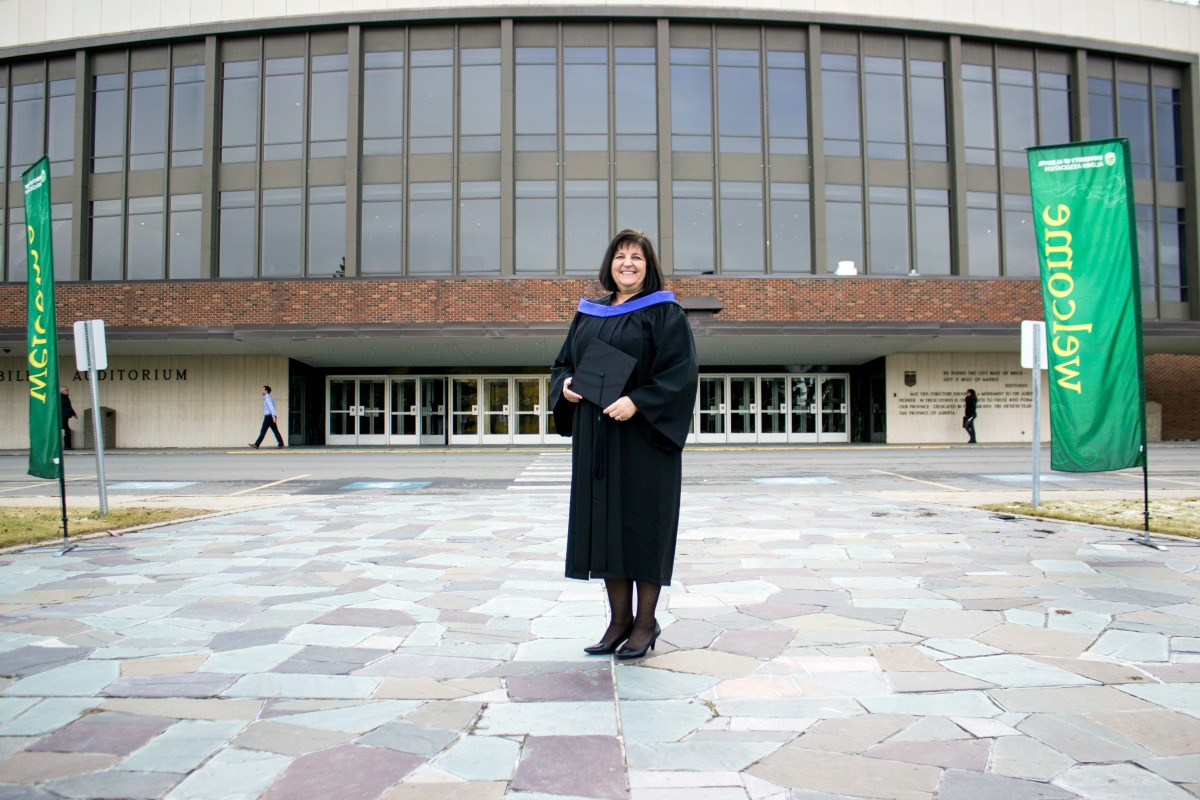After teaching music in an elementary classroom for 35 years, all it took to reignite the spark of learning for Irena Szmihelsky was an open studies music education course.
“It was an eye-opener,” says Szmihelsky of that first course. “It’s almost shameful for me to say how little I know in music after teaching it for so many years. I thought to myself, ‘I’m doing myself an injustice by ignoring the possibilities before me.’”
While continuing her higher education was a long-standing interest of Szmihelsky’s, the timing never quite worked out. She couldn’t see herself back in school when she was raising her children, teaching full time at J.J. Nearing Catholic Elementary School in St. Albert, Alta. and conducting the Ukrainian Dnipro Choir.
Once she made the decision to go back to school and pursue graduate studies as a part-time student in the Department of Elementary Education, she would hit her biggest obstacle yet.
“The summer before I started my master’s, my husband ended up in intensive care, and we weren’t certain he would pull through,” says Szmihelsky. “At the time [I knew] my husband would want me to do this, regardless of what would happen.”
Her husband’s condition improved, but the following year he would be back in intensive care, fighting for his life a second time.
“The coursework was a respite for me, because I could focus on something that I loved,” says Szmihelsky. “Even though other things were happening around me, I could get myself away from that for a while and concentrate on something that re-energized me.”
Embracing lifelong learning
Szmihelsky’s determination made an impact on her advisor, professor Kathy Robinson. Robinson says Szmihelsky wouldn’t let anyone or anything stand in the way of her learning and her goal of completing her master’s degree.
“Irena’s investment in her learning and her excitement with the changes in her knowledge, skills and classroom practice have been inspiring,” says Robinson.
“She stood out in her music education classes as a person who wasn’t afraid of tackling new and big ideas, nor was she afraid of trying new approaches to music teaching and learning in the classroom. This is exactly what we hope for when students embark on this graduate school journey.”
Since completing her degree, Szmihelsky has a new approach to the work she does as a music teacher. Previously, she had shied away from incorporating world music into the classroom, despite the fact that her own Ukrainian heritage had inspired her to pursue her chosen career.
“I was just being very narrow-minded in how I was approaching some of the goals and objectives in the program of studies,” explains Szmihelsky. “I have now realized how rich my classes could become with the inclusion of music from other cultures—while remaining faithful to the curriculum.”
Not only does she have a wealth of new resources to use in the classroom, but Szmihelsky also has a new outlook. Now that she has her master of education degree, Szmihelsky actively encourages her fellow teachers to pursue higher education, no matter their age.
“Yes, it is late in my life when I finished my master’s, but it was not too late,” says Szmihelsky. “Perhaps I’m walking away with so much more because I did it later in my teaching career. I had so much to reflect upon and respond to which moulded my journey through my master’s degree.”
“For me to go to convocation, the ceremony isn’t the important part. The achievement, the journey I was on is far more significant.”
Feature image: Irena Szmihelsky poses in front of the Northern Alberta Jubilee Auditorium before crossing the stage to receive her master of education degree at Fall Convocation 2016.
